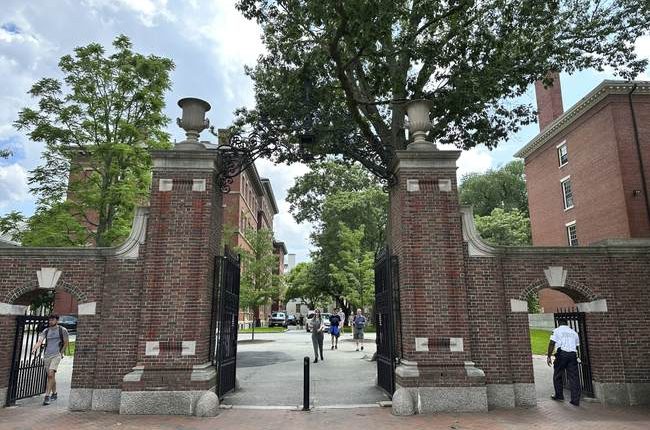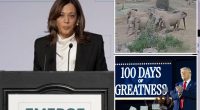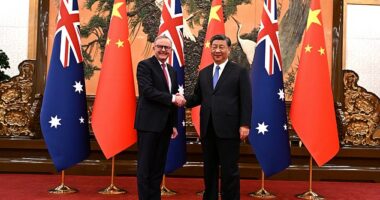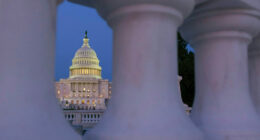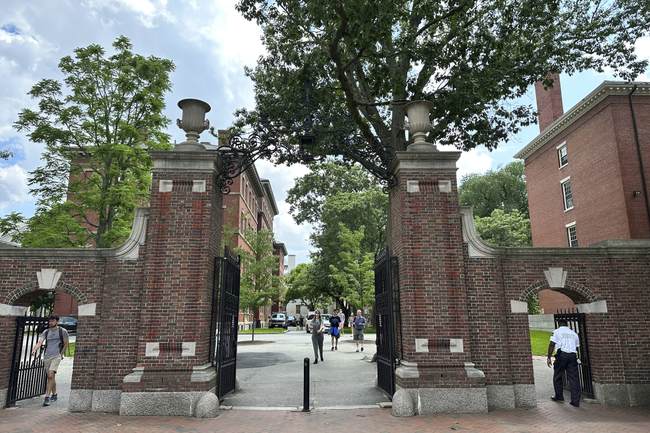
It was all the way back in January of 2024 that Harvard President Alan M. Garber announced a presidential task force on antisemitism and Islamophobia. Yesterday, more than a year later, those two reports were finally released.
This comes at a somewhat inconvenient time for Harvard which has taken the lead among US universities in objecting to the demands of the Trump administration. But the conclusions of the antisemitism report in particular seems to confirm that there as a serious problem at Harvard, one which warranted the attention that was given to it by Republicans in Congress and later by the Trump administration.
The full report on antisemitism is over 300-pages-long but I’m going to pull out some of the highlights, which are really lowlights for the school. From the executive summary here’s a description of how anti-Israel activism became toxic on campus as pro-Palestinian groups took every opportunity to make their issue a focus of attention on campus.
At Harvard, student lifecycle events that are meant to build a common civic identity as Harvard students (such as First-Year Convocation at Harvard College, and residency “Match Day” at Harvard Medical School) have become sites of pro-Palestinian protests as protestors seek to inject “the question of Palestine” into areas of student life. At a student-led conference in 2024, pro-Palestinian students at one School ensured that Palestine was a major topic, and the pro-Palestinian “virtual tote bag” given to participants contained an “action toolkit.” (This School’s leadership responded admirably to this event, acting promptly and decisively to remove the irrelevant material and re-focusing the event on its intended purpose.) Some faculty at Harvard and elsewhere have sought to support and inspire students to engage in these types of protests by excusing them from class, by signaling support with symbolic clothing, or by saying so directly or indirectly. As we discuss in Chapter 4, we found evidence that certain faculty were injecting highly partisan discussions of the Israeli-Palestinian conflict and of American Jewish groups in courses that had no direct connection with these subjects, apparently even before October 7th…
At their most extreme these tactics tend to reflect a conceptual framework that can be summarized as follows: Israel is not a sovereign state so much as a “settler colony” created and sustained by Western colonial powers and that, for all its military strength, can be broken and dismembered. As Harvard Out of Occupied Palestine (HOOP), a pro-Palestinian student group at Harvard that is not recognized by the University, said on October 8, 2024, a year after the Hamas invasion of Israel, “[Israel] is a genocidal regime [that] has exposed itself as an illegitimate state with no concern for life, its very foundation being the dehumanization and subjugation of Palestinians, aided and abetted by our own government’s and University’s callous disregard for Palestinian life … Make no mistake: The Zionist entity is crumbling and grasping for regional war as its only path towards survival.”
On campus, this attitude becomes an effort to shame and socially isolate Israeli or pro-Israel students.
We came to understand that this effort by some students to block Israelis at Harvard from building bridges and friendships could be seen as an attempt to practice what pro-Palestine activists have termed “anti-normalization.” Across Harvard, non-Jewish students unconnected to Israel told our Task Force that they had come under social pressure to end friendships with Israeli students. American Jewish students told us similar stories, where they felt pressure to condemn Israel to prove they were “one of the good ones” (meaning, an “anti-Zionist Jew”), and faced social consequences when they refused. This is best understood as an attempt to deny the humanity of Israelis, by treating them as pariahs unworthy of respect as fellow humans rather than fellow Harvard affiliates.
All of this escalated after the 10/7 attack on Israel by Hamas. Suddenly the hostility went to 11. Here’s how one grad student described it.
My experience has been different before and after October 7th. Before October 7th, being Jewish was largely irrelevant. It was not a barrier. I was proud to be Jewish. When it came up, it was positive. After October 7th, I experienced the following in this order: first there was pressure, then there was chaos, then hostility, and in certain spaces, the normalization of subtle discrimination like, “We’ll welcome you in this space if you align in a certain way. If not, you can’t come here.” This has to do with the enforcement of rules.
Suddenly, “Zionists” are enemy #1 on campus and some Jewish students feel this is just being used a substitute word for Jews. Here’s what an undergrad said about it.
There’s a tendency to replace the word Jewish with Zionist. “All Zionists should burn in hell” — it’s very frightening, there’s an incongruency between how different sides would define the term Zionist. People are proudly referring to themselves as anti-Zionist but there’s a strong overlap and it feels like this is an excuse to use a different term to make the point that they are anti-Jewish.
And Israeli students got the worst of it. This is from another undergrad:
The social exclusion and shunning of Israeli students lies at the core of the Harvard experience for many. From my first days on campus, I noticed students in pre-orientation avoiding conversation with me, simply out of fear of being associated with an Israeli. My friend has been told that others would not attend social gatherings if I was present, as they couldn’t risk the social consequences of being seen with an Israeli. Students have also chosen not to join an organization I led simply because I served in the IDF. Like other Israeli students currently at Harvard, I was excluded from the invitation list to comp for a final club, with members openly stating that IDF soldiers do not align with the club’s values. Israeli students at Harvard are not merely subjected to implicit bias but instead face explicit, deliberate discrimination.
Students also noted the clear double-standard in how anti-Zionist speech was treated.
Hearing the “river-to-the-sea” chants on campus is troubling. I approached an administrator about this, and their response was that these words could have multiple meanings. If I were part of the LGBTQ community and complained about offensive language, no one would tell me I was wrong to be upset because the language could be interpreted in multiple ways. The same would be true if I were Black and someone used offensive language around me. Why am I being told what is and isn’t antisemitism by an administrator?
One faculty member even described being surveilled when they visited the encampment on campus to listen to the speakers.
I was surveilled, identified by name, and profiled as a “Zionist” threat in a chat that reached far enough that an alum not at the protest, who I had no idea was even involved, knew exactly where I was and reached out with concern. I have not shared any of my views (complex and ever-changing) with students or in any public setting save for asking a question at a “teach in.” I have no idea what I did to end up on a blacklist, but whatever the reason I was profiled, beliefs about me that are inextricable from my Jewishness seem to have made me a potential target.
There’s a great deal more in this report but hopefully you get the gist of what was going on there. Anyone who refused to denounce Israel, which included a lot of Jewish or Israeli students, was treated like a criminal.
There’s also a similar report about Islamophobia. Here’s how the NY Times summed up that report:
A similar task force held hundreds of conversations with Muslim, Arab and Palestinian students, staff and faculty members about anti-Muslim bias. That task force summed up the feelings expressed by many of those people in two words: “abandoned and silenced.”
Some of the students interviewed expressed a constant fear of having their pro-Palestinian views revealed along with their identities, which they worried would lead to revoked job offers. They reported being called slurs like “terrorist” and “towelhead” for wearing kaffiyehs.
Palestinian students said they felt unsupported by Harvard administrators as they mourned loved ones who had died in Gaza.
“The feeling over and over again for Palestinians is that their lives don’t matter as much,” one student told the task force.
You can read that full report here.
